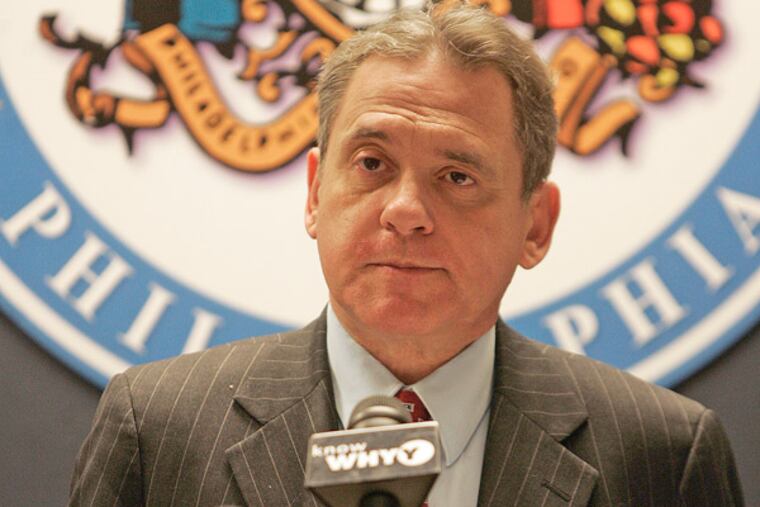New tax rates strain seniors in gentrified areas
RAYMOND BARLOW, 67, walked out of his modest rowhouse on the 500 block of Poplar Street, squinting as he surveyed the heavy equipment lining three active construction sites just a stone's throw from his front door.

To watch a video and read the original version of this article, go to AxisPhilly.org.
RAYMOND BARLOW, 67, walked out of his modest rowhouse on the 500 block of Poplar Street, squinting as he surveyed the heavy equipment lining three active construction sites just a stone's throw from his front door.
A longtime resident of Northern Liberties, a gentrifying area where new homes are being built at a rapid clip, Barlow is facing a steep increase in his property taxes under the Nutter administration's Actual Value Initiative. Both he and his wife, Barbara, are senior citizens on fixed incomes, and their home, which the city assessed at $52,100 last year, has a new market assessment of $275,000. At a property-tax rate of 1.25 percent, the Barlows' taxes will more than double in 2014 - going from $1,629 to $3,445, an increase that Barlow said could push them out of the home they purchased 37 years ago.
And he's not alone. The citywide reassessment means that senior citizens on fixed incomes who live in gentrifying areas all over the city face the prospect of similar hikes. Although the city's homestead exemption could offer some help to property owners who live in their homes and the Office of Property Assessment is offering homeowners the chance to appeal their assessments, there is no concrete plan in place to help seniors whose property values have drastically increased. Some City Council members are working with the Nutter administration to address the issue, but Barlow, who has watched his community change drastically over the past decade, does not believe help is forthcoming.
"I think there won't be any help at all," he said. "I think the mayor's full of crap. We filled that [homestead exemption] form out about keeping your taxes down. It's a bunch of bull. It's crap. They don't care about us. They're about money."
City Controller Alan Butkovitz released a report last week warning that gentrifying areas like Point Breeze and the Southwest Center City area would see big property-tax increases under AVI andlongtime residents would suffer.
"It's going to hurt them terribly," Butkovitz said. "They're going to be taxed as if they had the money to move into those neighborhoods right now, when clearly they don't."
Butkovitz said that as the data around the new assessments is examined and "severe unfairnesses" are discovered, protections should be put in place to help vulnerable property owners like the Barlows. But putting in such protections could put more pressure on other taxpayers by raising tax rates.
"It's like a Chinese finger puzzle," Butkovitz said of the property-tax system. "The more you pull it out, the more strain you put on it."
There is also the problem of state law, which does not allow local tax laws to benefit specific groups. Councilman Mark Squilla, whose 1st District encompasses Point Breeze and other areas that will be hard hit by AVI increases, said Council will have to figure out ways to help seniors and other vulnerable property owners despite those restrictions.
"I think we need to look at what state law will allow us to do," Squilla said. "Something maybe age- or need-based. But we have to be careful about how much safeguard we put in place, because the bigger the safeguard, the higher the tax rate gets."
Councilwoman Cindy Bass, one of the freshman members planning hearings around the issue of tax fairness, joined with Councilwoman Marian Tasco to talk with the Nutter administration about the issue.
"One of the things we talked about is, how do we make sure that we protect those homeowners who really don't care about the increased value in their homes?" Bass said. "This is their home, and they want to stay there. They bought the home at $50,000 and now it's worth $300,000, but they don't care. They don't want to sell.
"There may be some legislation that we can propose that says, 'Maybe you can put the brakes on the tax increase until the house is transferred or sold,' " Bass said. "The city can collect the difference out of the transaction. So, for instance, if you're currently paying $500 in property taxes and your bill is going to go up to $3,000 with the new rate, you continue to pay that $500 until you [die] or decide to sell. When the house is sold for that $300,000, the city would collect the difference in the tax rate from the sale proceeds. The seller would have to pay it."
For now, though, that's just an idea, and Bass acknowledges that it is only one part of the larger debate around property taxes.
Barlow, meanwhile, is frustrated - angry, even. And despite the ideas being discussed at City Hall to help soften the blow for homeowners like himself, Barlow is convinced that he is being forced out of his home.
"It's a shame because everybody down here, they've been here for years, they're on a fixed income," he said. "What you're doing is you're forcing us out. And you're doing it the backdoor way. If we can't get you out one way, we're getting you out taxwise. We're paying a lot of taxes already, and if the taxes double, that's a mortgage, almost."
